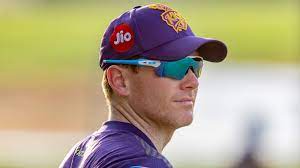believes that the advent of the Hundred will help preserve the viability of English cricket, because it will give more prominence to home-grown players, and prevent a mass exodus of non-England internationals to lucrative overseas leagues.

Speaking in the lead-up to this year’s Hundred, in which he will once again captain London Spirit having retired from international cricket earlier this summer, Morgan pointed out how important exposure to overseas leagues such as the IPL and Australia’s Big Bash had been to the development of his World Cup-winning side. But he believed that, in the future, the Hundred will be the vehicle that fine-tunes such emerging talents.
“For the majority of my career I’ve been a huge advocate for players going abroad and playing in big tournaments and taking on different roles, either as one of the senior players within the group, or one of a number of overseas players within a team,” he said. “There’s a different level of expectation around that. But when we have such a good tournament at home now, there’s no reason for that to happen in the same way.”

Morgan’s comments came on the eve of the announcement of the new UAE T20 League, that is set to offer its marquee players $450,000 contracts, and – with the first edition due to take place in January 2023 – is already causing ructions for the Big Bash, with David Warner among the players who may choose to play this tournament ahead of his own country’s event.
“I think the one thing that strong domestic tournaments produce is your domestic heroes,” Morgan added. “You normally only experience it when you play international cricket but tournaments like the Big Bash have produced Chris Lynn.
“He is a magnificent domestic player – international cricket hasn’t worked out for him – but when he walks around Australia, he’s a massive hero. People know exactly what he does and how he does it.
“As our tournament gets even bigger, we will see that in abundance. There are some tournaments in the world that are bigger than a lot of countries’ fixtures, bilateral series and anything else they play in between.
“The one thing the franchise model takes away from international cricket is a little bit of control, and ideally a franchise would want control of the biggest asset any country has – which is the players. Once you have that, what does international cricket offer?”
“It’s already happening, and we’re probably behind the eight-ball. We’re very, very lucky the Hundred has been the success it has, so we can develop the product and have the players involved.
“The one thing we have going for us is we still own and engage with our local players. If we ever lose that, there’s a serious issue. All of our players still want to play for England. They want to play Test-match cricket, ODIs or T20s. As soon as we lose that…”
The birth of the Hundred has proven controversial, with English cricket still divided as to the merits of a competition that now takes up the prime weeks of the season, and has caused England’s established competitions to be pushed to the margins of the summer, including the T20 Blast, whose 20th season concluded with Finals Day at Edgbaston last week.
And yet, in light of the IPL’s recent rights auction, which resulted in broadcast deals worth more than £5 billion, Morgan is realistic about the sport’s direction of travel, and the fact that global franchise tournaments are bound to grow at the expense of the historic formats of the game, including international cricket.
“For me, international cricket has always been the thing I strived to play in, and I’ve loved the opportunity of playing for Ireland and England,” Morgan said. “It allowed me to play against the best in the world. If that changes and the scale tips, I think it tips in only one direction.
The one thing the franchise model takes away from international cricket is a little bit of control, and ideally a franchise would want control of the biggest asset any country has – which is the players. Once you have that, what does international cricket offer? How much viability does it bring? The one thing it brings at the moment is [the chance to] have the best playing against the best the majority of the time. But once you take that away …”
Asked whether he felt that was a good or a bad thing, however, Morgan replied: “It’s just a thing. The good thing is cricket will grow regardless. The game will evolve regardless. It’s whether you want to change with it or not.



